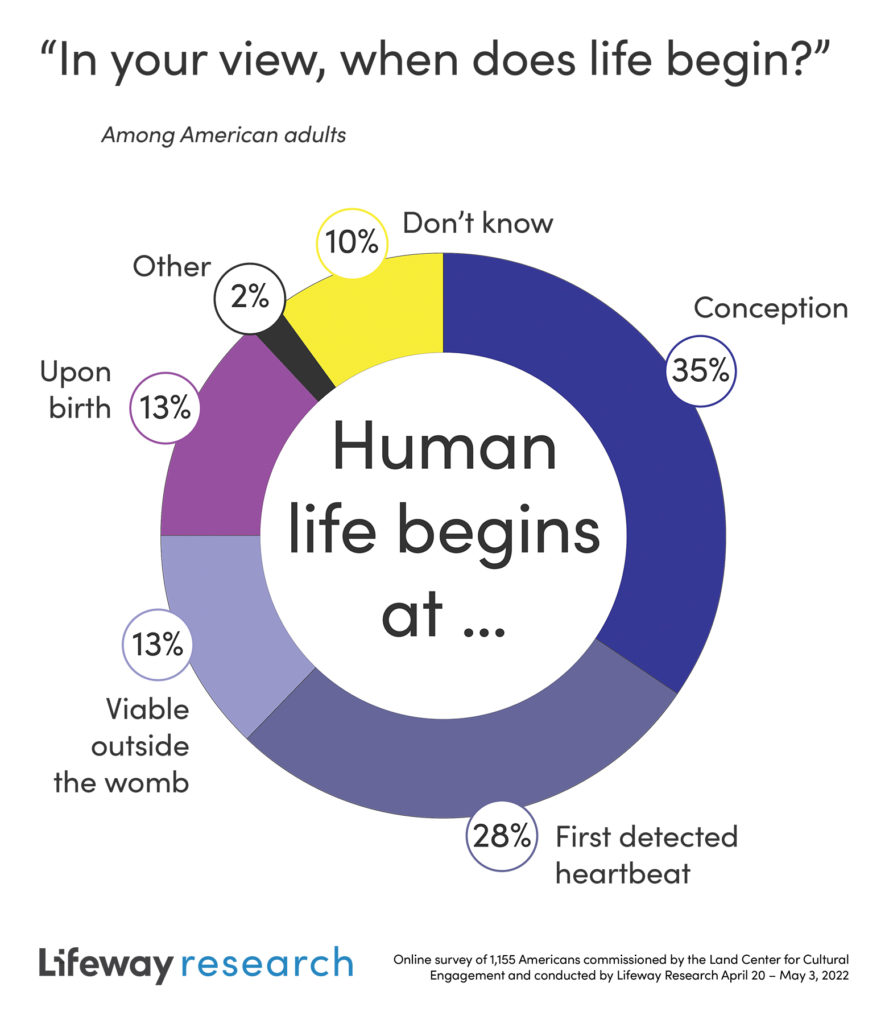For those who are pro-abortion rights, views on women’s rights and freedoms (74%) dominate the other factors, which include views on health and medical issues (46%), views on social issues (36%), views on morality (35%) and views on economic issues (32%). Close to 1 in 10 (9%) point to their religious faith.
Among those who have a more mixed perspective or who are unsure about the issue, half point to women’s rights (51%) and a third (32%) mention their religious faith.
“Americans’ own descriptions of how their views on abortion developed have strikingly different origins,” said Scott McConnell, executive director of Lifeway Research. “While the issue has been heavily politicized, almost all Americans claim they had these views without the influence of political leaders. One group says they’re heavily influenced by their views on women’s freedoms and the other by their views on religious faith and morality.”
While abortion generates much debate and discussion, other issues are personally important to more people. Americans are more likely to say inflation (85%), voting rights and security (76%), national debt (71%), foreign policy (67%), climate change (66%), immigration (66%) and race relations (65%) are important or extremely important to them than abortion (64%). Fewer Americans say the same about prison reform (49%).
Those who are either generally pro-life and pro-abortion rights are more likely than those who have a mixed opinion to see abortion as extremely important and view it as a key when determining their vote. Among the two opposing perspectives, pro-life individuals place more political importance on the issue. Pro-life Americans are more likely to say abortion is extremely important (52%) than those who are pro-abortion rights (40%). When choosing a candidate, 40% of pro-life Americans say the candidate’s view on this issue has an extremely strong impact on their willingness to vote for that person, compared to 34% of pro-abortion rights Americans and 14% of those who are in the middle or unsure.
Mixed Opinions on Life and Specifics
Americans have varying opinions on when human life actually begins and have complicated views on specific cases of abortion. Most say life begins at least by the first heartbeat detected, however, most also believe abortion should be legal if the child would be born with severe disabilities.
More than a third of Americans (35%) say life begins at conception, while 28% say at the first detected heartbeat. Almost 1 in 8 say life begins when the fetus is viable outside the womb (13%) or upon birth (13%). Few (2%) say at another point, and 10% say they honestly don’t know.

Protestants are most likely to say life begins at conception (49%), as are Americans of other faiths (39%). Catholics are most likely to say at the first detected heartbeat (40%). Religiously unaffiliated Americans are the most likely to say at birth (28%) and viability (20%). Americans with evangelical beliefs (66%) are more than twice as likely as non-evangelicals (29%) to say life begins at conception.
Most Christians who attend church weekly (56%) say life begins at conception, while those who attend less frequently are more evenly split between conception and the first heartbeat.
“Since the Roe v. Wade decision, it has been legal to end what the majority of Americans consider a human life,” said McConnell. “People’s perspectives on the start of life varies greatly by religious faith. Those with no religious affiliation are less likely than any other demographic group to say life begins by the time of the first heartbeat. This contrasts sharply with the almost 9 in 10 with evangelical beliefs who say it does.”
When asked specifically what time period they believe abortion should be a legal option assuming there are no health issues for the woman or the fetus, half of Americans say no later than 12 weeks (about 3 months), including 26% who say it shouldn’t be legal at any point, 15% who say up to six weeks and 11% who say up to 12 weeks. Fewer set the time frame at later dates, such as 15 weeks (7%), 20 weeks (6%), 24 weeks (4%), 28 weeks (4%) or up to birth (10%). Almost 1 in 6 (17%) say they aren’t sure.
Even among those who are not generally pro-life, there is broad consensus for abortion restrictions. Almost 3 in 5 Americans (59%) who are unsure or somewhere between pro-life and pro-abortion rights, favor limiting legal abortion to no later than 12 weeks. Among the pro-abortion rights, 50% place the limit somewhere prior to 20 weeks (about four and a half months).

